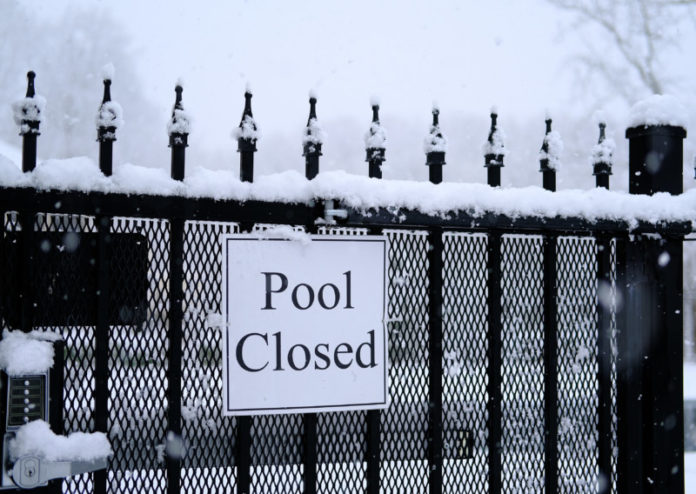
One of the hardest parts about owning a pool is not being able to use it during the winter months. The fun summer days have come and gone and you’ll need to set your pool up for the dormant months of winter.
Here’s a quick guide on how to winterize your pool the right way and set yourself up for an easy transition back to summer when the time’s right.
When Should You Winterize Your Pool?
A great rule of thumb is to start the winterization process once temperatures are more consistently below 65 degrees Fahrenheit. At this point, you’re less likely to use the pool and you’ll avoid algae issues inherent to higher water temperatures.
It’s important not to close everything down too early and it’s important to keep the temperature in mind when you make the decision to begin winterizing.
Where To Start
Ladders And Accessories
There are many steps to winterizing but the best place to start is by removing accessories and ladders if they can be moved. Most ladders may be stored outside during the winter months but plastic generally does better away from the elements, and other plastic components will need to be brought in to protect them from the elements.
Clean Your Pool
Brush, skim, and vacuum your pool to start with a clean slate. The pool should be spotless when you cover it up and cleaning the pool will help prevent debris from settling into your bottom paint and ruining it. It’s important to be extra clean in this step as any winter chemicals you put in your pool will be less effective with algae and other organic matter laying in it.
A few days before you add winter chemicals, shock your pool to work on the debris that’s left and help balance your water against algae growth.
Balance Your Water
Once your pool is clean and clear, take the time to start winter with the right water balance. Start with pH, test, and adjust within the 7.2-7.4 range using the appropriate chemicals. Your total alkaline counts should be in the 80-150 ppm range, and calcium hardness should be 180 ppm or higher.
We can’t stress enough how important it is that your pool be free of any visible algae and be as clean and clear as possible. If it isn’t clean and clear, shock the pool as much as needed and clean the pool until it looks right.
Balance your water ahead of time so the chemicals are distributed throughout the water.
Shut Down Components
Heater pilots are components that are often missed, but if you’re running a continuous pilot in your system, remember to shut it down for the winter. On other heaters, be sure to remove piping if needed and drain any systems.
You’ll need to power off all of your electrical systems as well. This includes pumps, salt systems, and chemical pumps. Disconnect all of your components and hit the fuse on them to prep them for winter.
Be sure to drain any water from the pumps and hoses if you can, especially for below-freezing conditions.
Add Closing Chemicals
There are kits that come with everything you need for this step. These kits include great chlorine-free treatments and chemicals that are safe for the paint in your pool.
The most important thing to consider in picking these chemicals is to minimize the amount of chlorine used. Chlorine has a tendency to stain paint and can be difficult to keep track of if you’re using a floater or similar device.
A pool enzyme might also be helpful to prevent algae growth if you use a mesh safety cover after pool closure.
Cover Your Pool
And sadly. The final step in winterizing your pool.
Skim your pool one last time and clean your pool cover if needed. Your pool needs to be spotless and a dirty pool cover is no good. Check for any damage to your cover and if it’s extensive you might want to replace your cover. For any small damage, move the problem areas over to the side of your pool to help with debris landing in it.
With these tips, you’re well on your way to winterizing success. Be sure to clean up your pool and balance your water for the best results. And if you’re concerned with any of the steps mentioned, consult a professional to help square your pool away. The damage of a poorly winterized pool might not always be bad, but it’s better to be safe than sorry.
For more information about your pool needs – click here!
Peek Pools and Spas
2526 Duplex Road
Spring Hill, TN 37174
615-866-8800
Have a question for Peek Pools? Fill out the form below:















